Students from Taiwan Tech focus on Traffic Safety and develop fiber-optic warning devices for vehicle faults to reduce rear-end collision rates.
When driving, if a vehicle breaks down or is involved in an accident, people must place a warning triangle behind the vehicle to avoid being rear-ended. However, rear-end collisions on highways are still common. To address issues such as the low height of traditional warning triangles and the high risk of manually placing them, students from the Department of Design at Taiwan Tech have designed the “Mopti-fi Small Vehicle Fault Fiber Warning Device” using the characteristics of optical fibers. They successfully integrated innovative thinking into the field of traffic safety. This device, selected from 543 entries, received the third prize and a scholarship of 100,000 yuan in the 2023 Corning Future Innovator - Innovative Application Competition.
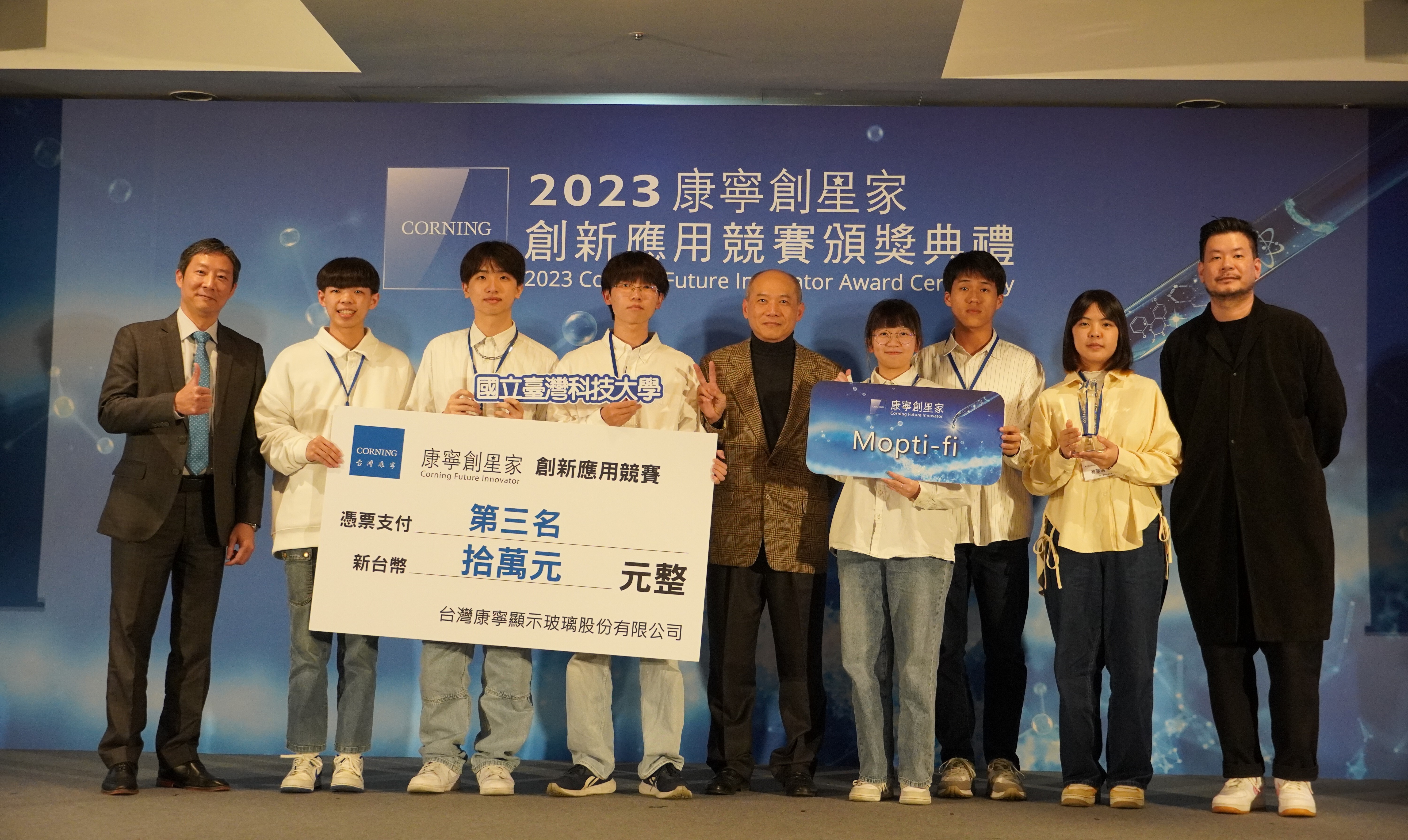
A second-year student from the Department of Design at Taiwan Tech received the third prize and a scholarship of 100,000 yuan in the 2023 Corning Future Innovator - Innovative Application Competition.
According to statistics from the Daoan Information Query Network, “Failure to Pay Attention to the Front of the Vehicle” ranks first nationwide as the cause of accidents involving small vehicles. The team composed of second-year design students, Qin-Hao Lin, Xu-Dong Yuan, Kun-Chen Luo, Zhec-Cheng Zhang, Jing-Han Chen, and Yi-Yu Lin, targeted traffic safety issues closely related to the public. They integrated the characteristics of lightweight, flexible, and waterproof optical fibers into a small autonomous vehicle. By fixing one end of the device on the car roof and remotely controlling the self-driving car to move backward through a mobile app, the extended optical fiber warning light strip forms a large and highly recognizable fiber wall. This effectively warns the approaching vehicles from behind, reducing the probability of rear-end collisions.
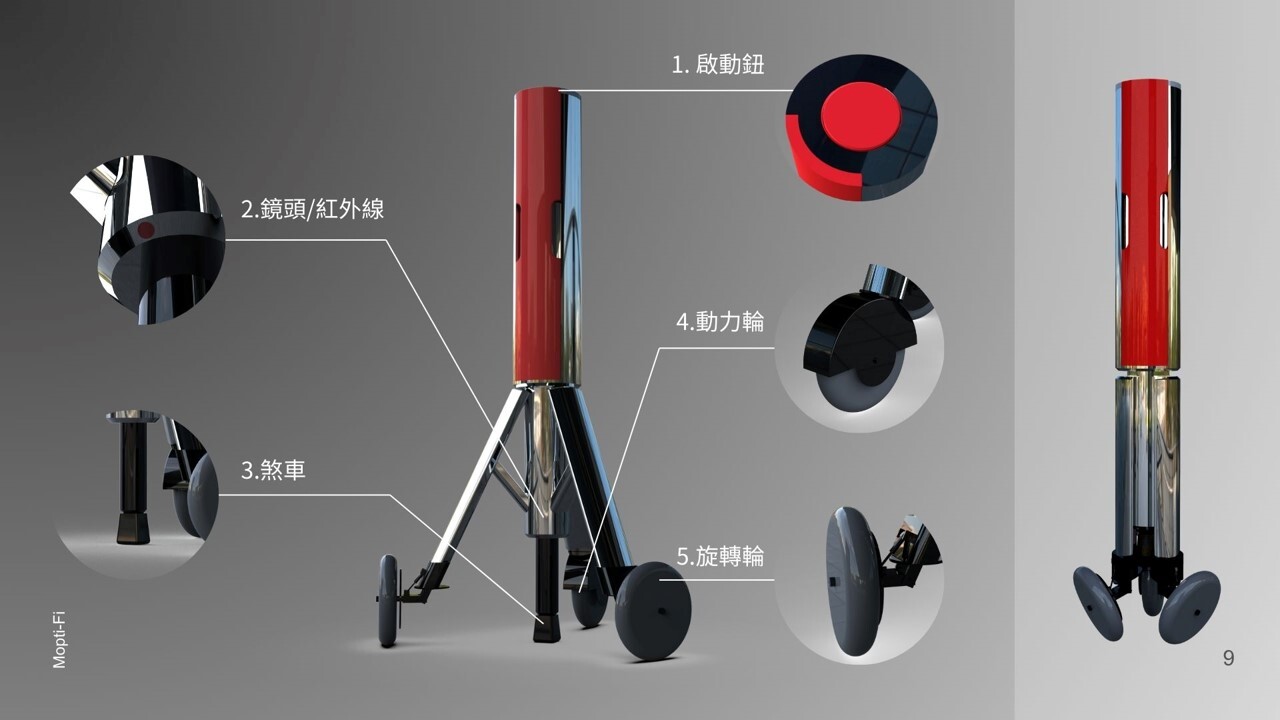
The 'Mopti-fi Small Vehicle Fault Fiber Warning Device' includes an infrared camera and power wheels, which can be folded and stored when not in use.
The “Small Vehicle Fault Fiber Optic Warning Device” is also equipped with an infrared camera, power wheels, and brakes, which can adapt to dim light conditions at night and sloped terrains. The concept includes an exclusive mobile app that allows users to control the movement of the optical fiber warning device via their smartphones from a safe location. The movement of fiber optic warning devices, monitoring of the situation behind the vehicle, and taking photos of accidents, greatly reduces the danger of artificially placing warning signs and ensures the safety of users.
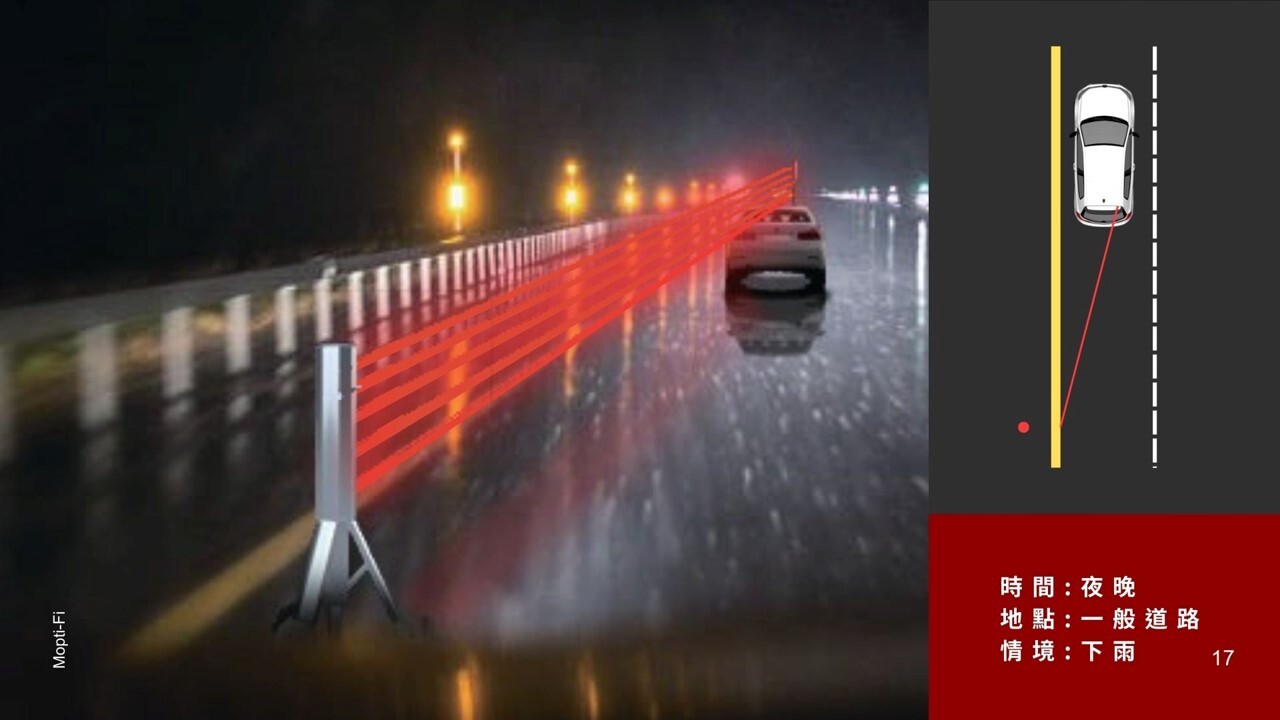
The extended optical fiber warning light strip from the device forms a large and highly recognizable fiber wall. Even in rainy weather, it can effectively warn the approaching vehicles from behind, reducing the probability of rear-end collisions.
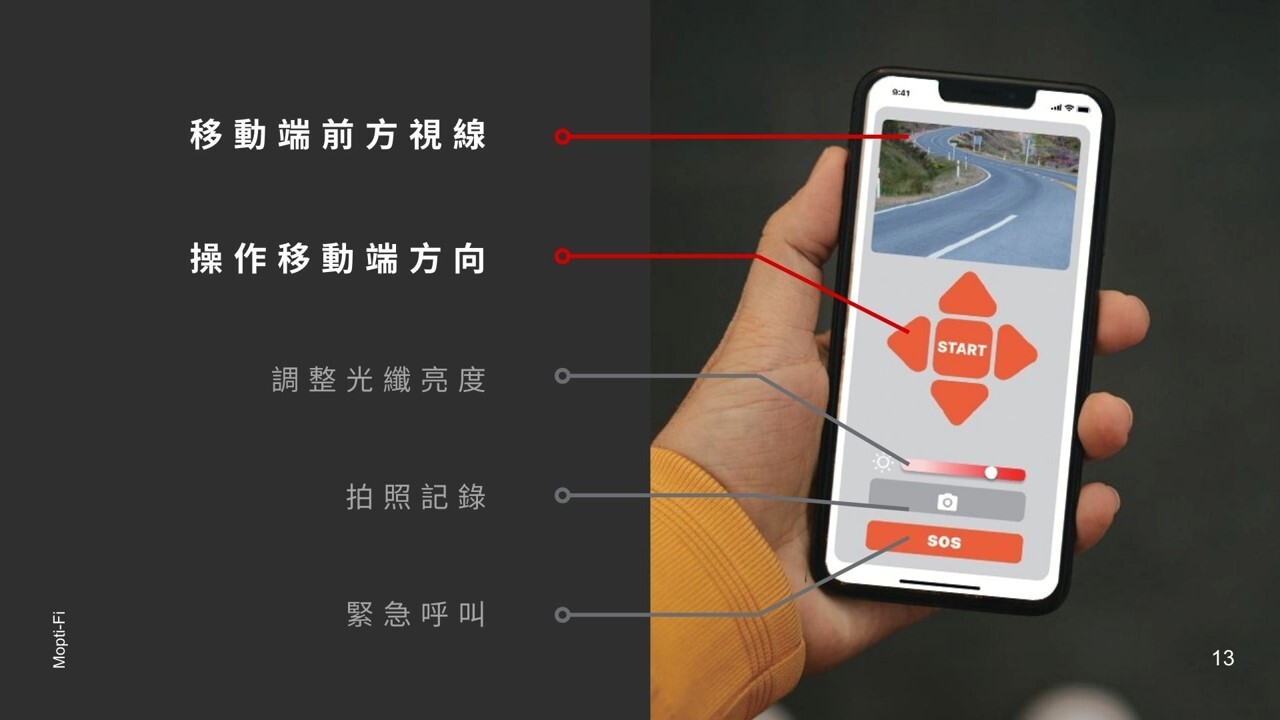
The team proposed the concept of a dedicated app for the 'Mopti-fi Small Vehicle Fault Fiber Warning Device,' further enhancing user safety.
The design team pointed out that during the development process, they faced challenges in terms of structure and folding methods. Additionally, their limited understanding of optical fiber materials posed difficulties. However, through multiple discussions and professional guidance, they successfully overcame these obstacles, making the product more refined. They encouraged younger students to seize opportunities and participate in competitions during their spare time, emphasizing that despite feeling time constraints and pressure, the experience gained in the process goes beyond what is learned in the classroom.
The competition required participants to conceive innovative product ideas using Corning materials (glass, ceramics, optical fiber). Consequently, students encountered significant challenges in material application. Assistant Professor Shih-Hsu Lin, the guiding teacher, noted that "constraints are part of the design process that is different from art; overcoming real-world problems is a necessary path". Participating in the competition allows for an objective observation of other design strategies, identifying one's differences, strengths, and weaknesses, and stimulating the driving force for innovation.
“Imagination is a quality that designers need, often requiring long-term stimulation, training, and experience accumulation," said Assistant Professor Shih-Hsu Lin. He believes that the organizers also take advantage of such opportunities to unleash each other's imaginative space and explore future possibilities. Assistant Professor Shih-Hsu Lin shared that during the creation process of this work, the team faced initial rejection from the topic selection, underwent multiple revisions and reconstructions, and the final appearance of the product underwent a complete transformation. It was almost a collaborative creation between the teacher and the students. Later, during the Corning workshop, they incorporated a scenario of curved road usage, maximizing the overall characteristics of the product.
In addition, Kai-Jie Xue, a first-year master's student in the Department of Design at Taiwan Tech, designed a fully automatic grinding coffee machine that turns coffee grounds into a natural cleaning agent, addressing the sustainable recycling issue of coffee grounds. This work stood out among over 500 entries and won the first prize.

The first-year master's student in the Department of Design of Taiwan Tech, Kai-Jie Xue, was selected in the 2023 Corning Corning Future Innovator - Innovative Application Competition.
Kai-Jie Xue explained that her work was inspired by glass as a medium. She aimed to improve traditional coffee machines, coffee cups, water tanks, and bean hoppers that use materials prone to scratching. The detergent residues and other harmful substances that are harmful to human health are eliminated, and the detergent made from coffee grounds is purely natural, allowing users to enjoy delicious coffee while achieving cycle sustainability and maintaining health.
Xue Kaijie expressed that the competition exposed her to the talents and enthusiasm of many participants, serving as a source of motivation. She looks forward to applying her learning to more challenging projects in the future.
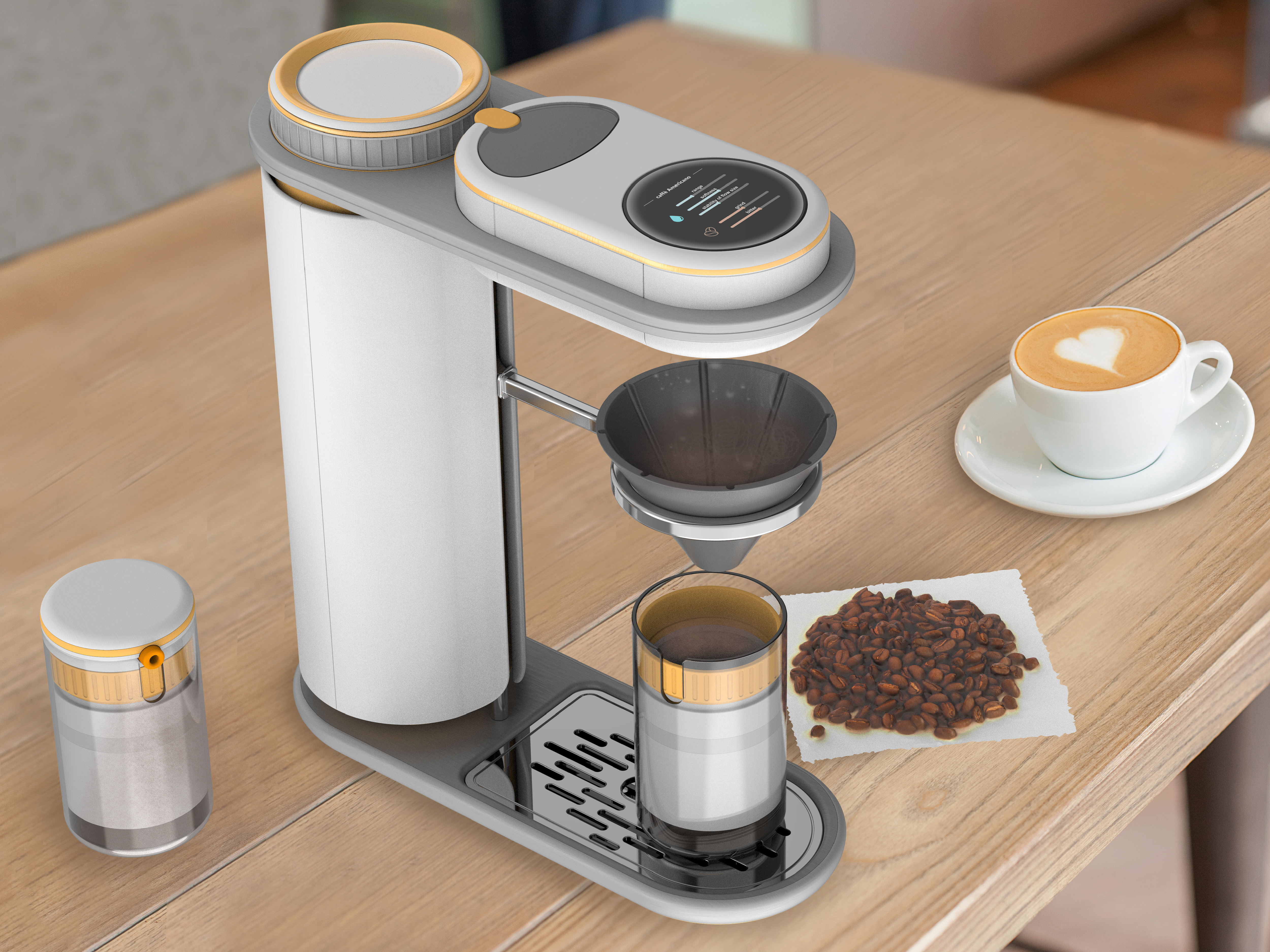
Kai-Jie Xue developed a product, the "Coffee COleaner" smart coffee brewing machine, which not only can brew coffee but also has the added feature of transforming coffee grounds into a natural cleaning agent.
